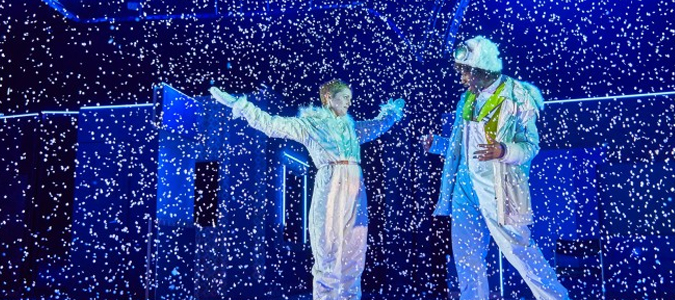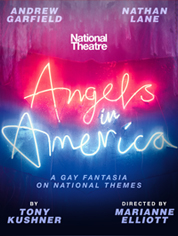

Angels in America
Opening Night: March 25, 2018
Closing: July 1, 2018
Theater: Neil Simon Theatre
A quarter-century after stunning the theatre world, one of the greatest theatrical journeys of our time returns to Broadway in a production from London’s National Theatre, starring Nathan Lane and Andrew Garfield. Angels in America’s two parts, Millennium Approaches and Perestroika, will run in repertory during a limited engagement.
BUY TICKETSREAD THE REVIEWS:
March 25, 2018
Sometimes, just when you need it most, a play courses into your system like a transfusion of new blood. You feel freshly awakened to the infinite possibilities not only of theater but also of the teeming world beyond. And when you hit the streets afterward, every one of your senses is singing.
Such is the effect of seeing the flat-out fabulous revival of Tony Kushner’s “Angels in America,” which opened on Sunday night at the Neil Simon Theater, with a top-flight cast led by Andrew Garfield and Nathan Lane in career-high performances. This is the 25th anniversary production of Mr. Kushner’s two-part, seven-and-a-half-hour multi-award-winning masterwork about death and destruction in Ronald Reagan’s America.
Does that last sentence make your eyes glaze with the weighty worthiness of it all? Since it was first staged on Broadway in 1993, “Angels in America: A Gay Fantasia on National Themes” (to use its full, colon-toting title) has acquired the marbleized patina of something stately and grand, a work to be approached with reverence and a dictionary.
READ THE REVIEWMarch 25, 2018
March 25, 2018
The National Theater production of Tony Kushner’s phenomenal 1993 epic work doesn’t feel like a historical artifact that won the Pulitzer Prize, two Tony Awards, an Olivier Award, an Emmy, and the National Medal of Arts for its author. In fact, experiencing this revival of the 25-year-old play feels more like picking up a scorching hot ember from a fire that won’t burn out. The scribe’s thoughts about religion, politics, sex, morality, mortality, civic corruption and environmental calamity – as viewed through the prism of the 1980s AIDS crisis – seem every bit as prescient as they did when all our friends were dying. Helmer Marianne Elliott’s production for the National approaches Kushner’s overflowing dramatic riches by balancing the realistic style of the early domestic scenes with the fantastic surrealism of the later dream sequences. Ian MacNeil’s turntable set of little boxes outline in neon (Paule Constable did the lighting) seems too confining for such a sweeping and timeless work – and what on earth is that metallic spaceship-thingy hovering over everyone’s heads?
READ THE REVIEWMarch 25, 2018
Angels in America, that winged masterwork of Tony Kushner and the 20th Century, is back on Broadway in a revival weighed with expectations as heavy as the angel Bethesda in Central Park. With marquee-name stars – Andrew Garfield, Nathan Lane, Lee Pace – and the halo of approval from London audiences, the two-part, 7-hour-plus, gloriously subtitled “Gay Fantasia On National Themes” remains as rich a theatrical experience as when Kushner won the Pulitzer back in ’93 and his eccentric, visionary fever dream first blessed the stage (and too many dying men to count) with “more life.” It wasn’t a given, you know, this return that’s triumphant if not perfect. As we’re told by the play’s heroic, AIDS-stricken Pryor Walter (Garfield), the world only spins forward, and, man, has it done some spinning these last 25 years. AIDS is no longer a death sentence – though how anyone could thing that might lessen the play’s impact is dumbfounding – and the up-is-down mendacity of Roy Cohn’s right-wing school of power-broking literally eulogized in Angels has proven more tenacious than even Kushner’s all-seeing seraphim might have imagined.
READ THE REVIEW




















